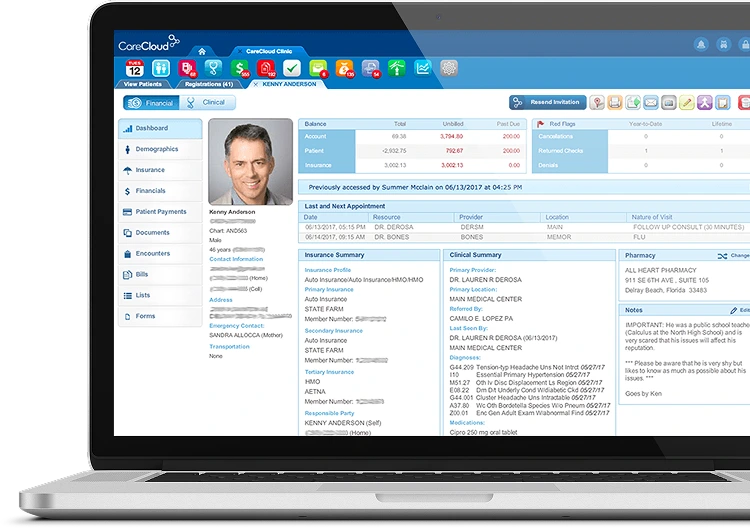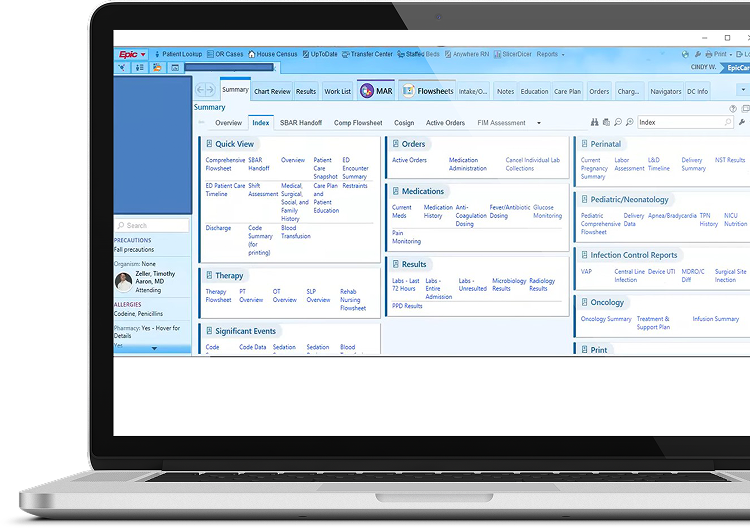-
- NASDAQ: CCLD $2.5
- 1-877-342-7517
With so many providers claiming to offer the best EHR software, the process can feel overwhelming. That is the reason why it is more important now to know who the main companies are and what they truly provide.

CareCloud is a leading cloud-based healthcare technology company founded in 1999 in New Jersey. They primarily target small to large-sized practices. The company is serving more than 40,000 providers across the US. Its EHR platform smoothly integrates with telehealth, practice management, and analytics modules, which demonstrate interoperability using FHIR and SMART standards as well as specialty-specific workflows for different medical fields.

Epic Systems is yet another leading EHR provider. Founded a while back in 1979, it is now headquartered in Verona, Wisconsin. The company is well-optimized for large health systems and hospitals, but since the company’s design is modular, mid-sized practices can also opt for it. Their focus is on smooth data exchange through FHIR Standards and solid partnerships with Microsoft/Nuance for Ambient AI. This is the reason why they are at the forefront of EHR technology.

Cerner, founded in the year 1979, in Kanas City, Missouri, was a pioneer in health information technology. Oracle acquired it in 2022, and now it is commonly known as “Oracle Health.” Nowadays, this platform is using Oracle’s cloud infrastructure and AI Automation to polish up its Oracle Health EHR. They are currently targeting large health systems, huge hospitals, and government institutes. Having major US Government contracts like the Department of Defense and Veterans Affairs under their belt, the company claims to serve 27,000 providers across more than 35 countries.

NextGen Healthcare, formerly known as Quality Systems Inc., was founded way back in 1974 in Corona, California. It is now headquartered in Atlanta, Georgia. NextGen Healthcare is a cloud-based EHR platform with a core focus on ambulatory and specialty practices. Their target market is small to medium-sized practices across the US. The EHR that they offer is AI-powered in terms of clinical documentation and revenue cycle management, and their interoperability tools work with FHIR/HL7 standards.

Allscripts, now known as Veradigm, was founded in 1981 and is based in Chicago, Illinois. With a primary focus on small and mid-sized ambulatory and specialty practices, Veradigm provides a cloud-based EHR. Like many others, their EHR also has AI-powered specialty-specific workflows. The company combines medical analytics, telehealth, and patient engagement tools into one solid platform. They have recently released Veradigm Ambient Scribes that use AI for taking clinical notes smartly and quickly.

Athenahealth was founded a little while back in 1997 in San Diego, California. Nowadays, they are headquartered in Watertown, Massachusetts. Athenahealth is focused on small to mid-sized practices for providing them with ambulatory care and integrated practice management software. Their EHR software is cloud-based, but currently, they are working on providing AI-based clinical notes and other AI-based tools to their clients in order to reduce the administrative and financial burden.

Established in 2021 through the merger of Kareo and PatientPop and headquartered in Newport Beach, California, Tebra is a cloud-based electronic health record (EHR) and practice growth platform designed for independent healthcare providers. Tebra also targets small and medium-sized practices. Having AI-driven clinical, financial, and operational tools under their belt, Tebra helps reduce admin burden and helps in the overall growth of practices.

Founded in 2005 and based in San Francisco, California, Practice Fusion is a web and cloud-based electronic health record (EHR) platform serving ambulatory and independent practices. Targeting small to solo practices in the US, Practice Fusion EHR offers a free patient portal. The company has combined AI-powered charting, RCM, and interoperability tools via FHIR/HL7 standards into a singular platform. The company is working on improved MIPS reporting tools to provide value-based care compliance.

Founded in 1999 in Westborough, Massachusetts, eClinicalWorks is a cloud-based electronic health record company serving thousands of practices globally. Targeting small to mid-sized ambulatory practices, eClinicalWorks has been dominating the market with its AI Products and tools like Sunoh.ai. Their recent milestones include achieving Qualified Health Information Network (QHIN) designation, enabling nationwide secure data exchange, and real-time access to consolidated patient records.
Research from “forecasts” indicates the global electronic health records market reached from over USD 30 billion in 2025 to over USD 50 billion by 2034. Various reports indicate a compound annual growth rate (CAGR) ranging from approximately 5.0% to over 7% during this period.
This expansion reflects healthcare organizations’ ongoing adoption of EHR systems, driven by Meaningful Use requirements and the increasing demand for enhanced healthcare transparency, reporting capabilities, and system interoperability. Given the complexity of selecting the right EHR solution, we have developed a comprehensive framework with essential evaluation criteria and key vendor inquiries to streamline and optimize the selection process for healthcare organizations.


We’re Here to Help
Our experts are ready to assist
you in real-time.
